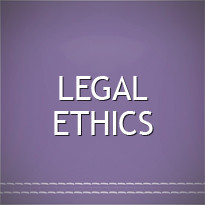A.M. No. 08-6-352-RTC – 613 Phil. 1 – 596 SCRA 378 – Legal Ethics – Judicial Ethics – Government Lawyers, Generally, Cannot Engage in Private Practice of Law; Prohibition has limited application even after separation from service
In February 2008, Atty. Karen Silverio-Buffe resigned as the Clerk of Court of RTC 81, Romblon. She immediately engaged in private practice of law and even appeared in three cases before her former office (RTC 81).
Apparently, she received a complaint about her appearances in RTC 81 because under the law, she is prohibited from appearing in RTC 81 within one year from her separation from that office or until February 2009. The pertinent law provides:
Section 7(b)(2) of R.A. No. 6713 (The Code of Conduct and Ethical Standards for Public Officials and Employees)
SECTION 7. Prohibited Acts and Transactions. – In addition to acts and omissions of public officials and employees now prescribed in the Constitution and existing laws, the following shall constitute prohibited acts and transactions of any public official and employee and are hereby declared to be unlawful:
x x x
(b) Outside employment and other activities related thereto. – Public officials and employees during their incumbency shall not:
x x x
(2) Engage in the private practice of their profession unless authorized by the Constitution or law, provided, that such practice will not conflict or tend to conflict with their official functions; or
x x x
These prohibitions shall continue to apply for a period of one (1) year after resignation, retirement, or separation from public office, except in the case of subparagraph (b) (2) above, but the professional concerned cannot practice his profession in connection with any matter before the office he used to be with, in which case the one-year prohibition shall likewise apply.
Atty. Silverio-Buffe filed two petitions for declaratory relief questioning Sec. 7(b)(2), RA 6713 but her petitions were denied. She now submitted a letter query to the Supreme Court questioning the law.
Atty. Silverio-Buffe argues that the provision is unfair because, in effect, it allows incumbents to practice law while non-incumbents like her are prohibited. She advances the position that the prohibition should be understood to mean that: she could handle pending cases in RTC 81 “so long as her appearance as legal counsel shall not conflict or tend to conflict with her former duties as former Clerk of Court of that Branch.”
ISSUE: Whether or not Atty. Silverio-Buffe is correct.
HELD: No. She misread the law. Under Section 7(b)(2) of R.A. No. 6713, incumbents, in this case lawyers or specifically employee-lawyers of the judiciary, are allowed to engage in private practice provided the constitution or the law does not prohibit them. There is however a law that prohibits incumbent lawyers of the judiciary from engaging in law practice which is Section 5, Canon 3 of the Code of Conduct for Court Personnel. Thus, court lawyers are actually prohibited from engaging in private practice of law or any practice outside their office. This prohibition promotes the observance and the efficient use of every moment of the prescribed office hours to serve the public.
On the other hand, Section 7(b)(2) of R.A. No. 6713 allows non-incumbents to practice law. Thus, when she resigned, Atty. Silverio-Buffe is allowed to practice law. The only prohibition is that she cannot appear as counsel before RTC 81 until February 2009 (or for one year from separation). This prohibition is anchored on the principle that public office is a public trust; and serve to remove any impropriety, real or imagined, which may occur in government transactions between a former government official or employee and his or her former colleagues, subordinates or superiors.


